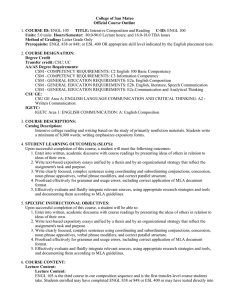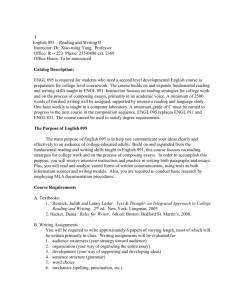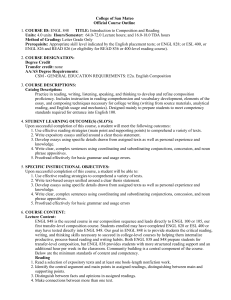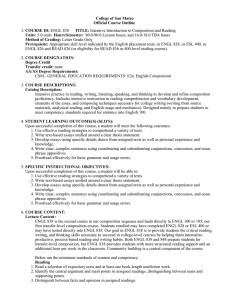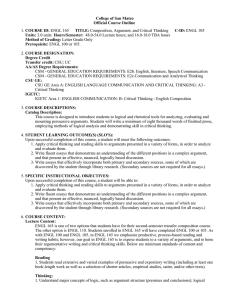College of San Mateo Official Course Outline COURSE ID: Units:
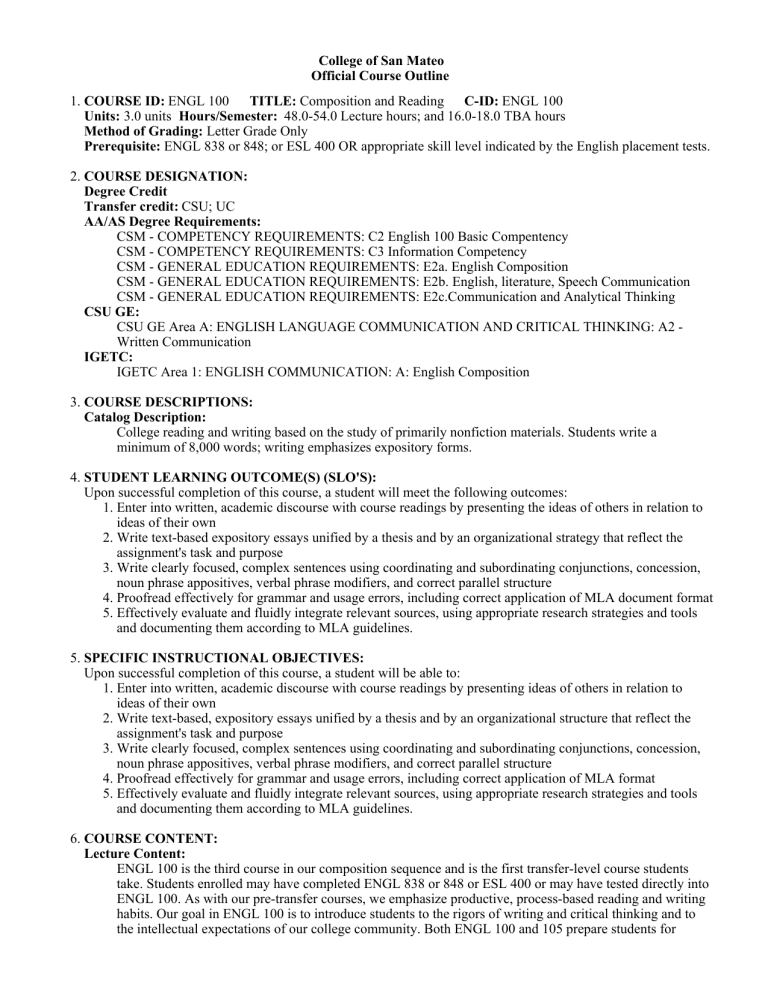
College of San Mateo
Official Course Outline
1.
COURSE ID: ENGL 100 TITLE: Composition and Reading C-ID: ENGL 100
Units: 3.0 units Hours/Semester: 48.0-54.0 Lecture hours; and 16.0-18.0 TBA hours
Method of Grading: Letter Grade Only
Prerequisite: ENGL 838 or 848; or ESL 400 OR appropriate skill level indicated by the English placement tests.
2.
COURSE DESIGNATION:
Degree Credit
Transfer credit: CSU; UC
AA/AS Degree Requirements:
CSM - COMPETENCY REQUIREMENTS: C2 English 100 Basic Compentency
CSM - COMPETENCY REQUIREMENTS: C3 Information Competency
CSM - GENERAL EDUCATION REQUIREMENTS: E2a. English Composition
CSM - GENERAL EDUCATION REQUIREMENTS: E2b. English, literature, Speech Communication
CSM - GENERAL EDUCATION REQUIREMENTS: E2c.Communication and Analytical Thinking
CSU GE:
CSU GE Area A: ENGLISH LANGUAGE COMMUNICATION AND CRITICAL THINKING: A2 -
Written Communication
IGETC:
IGETC Area 1: ENGLISH COMMUNICATION: A: English Composition
3.
COURSE DESCRIPTIONS:
Catalog Description:
College reading and writing based on the study of primarily nonfiction materials. Students write a minimum of 8,000 words; writing emphasizes expository forms.
4.
STUDENT LEARNING OUTCOME(S) (SLO'S):
Upon successful completion of this course, a student will meet the following outcomes:
1.
Enter into written, academic discourse with course readings by presenting the ideas of others in relation to ideas of their own
2.
3.
Write text-based expository essays unified by a thesis and by an organizational strategy that reflect the assignment's task and purpose
Write clearly focused, complex sentences using coordinating and subordinating conjunctions, concession, noun phrase appositives, verbal phrase modifiers, and correct parallel structure
4.
5.
Proofread effectively for grammar and usage errors, including correct application of MLA document format
Effectively evaluate and fluidly integrate relevant sources, using appropriate research strategies and tools and documenting them according to MLA guidelines.
5.
SPECIFIC INSTRUCTIONAL OBJECTIVES:
Upon successful completion of this course, a student will be able to:
1.
Enter into written, academic discourse with course readings by presenting ideas of others in relation to ideas of their own
2.
3.
Write text-based, expository essays unified by a thesis and by an organizational structure that reflect the assignment's task and purpose
Write clearly focused, complex sentences using coordinating and subordinating conjunctions, concession, noun phrase appositives, verbal phrase modifiers, and correct parallel structure
4.
5.
Proofread effectively for grammar and usage errors, including correct application of MLA format
Effectively evaluate and fluidly integrate relevant sources, using appropriate research strategies and tools and documenting them according to MLA guidelines.
6.
COURSE CONTENT:
Lecture Content:
ENGL 100 is the third course in our composition sequence and is the first transfer-level course students take. Students enrolled may have completed ENGL 838 or 848 or ESL 400 or may have tested directly into
ENGL 100. As with our pre-transfer courses, we emphasize productive, process-based reading and writing habits. Our goal in ENGL 100 is to introduce students to the rigors of writing and critical thinking and to the intellectual expectations of our college community. Both ENGL 100 and 105 prepare students for advanced composition courses, but ENGL 105 provides students with more structured reading and writing
1.
2.
3.
4.
5.
6.
1.
2.
3.
4.
1.
2.
3.
4.
advanced composition courses, but ENGL 105 provides students with more structured reading and writing support through an additional 100 minutes per week of classroom instruction. Community building is a central component of the course.
Below are the minimum standards of content and competency.
Reading
Read a selection of expository texts and at least two book-length works, only one of which may be fiction.
Identify the central argument and main points in assigned readings, distinguishing between main and supporting points.
Distinguish between facts and opinions in assigned readings.
Make connections between more than one text.
Develop proficiency in acquiring new vocabulary.
Distinguish between an author’s own arguments and his or her presentation of counterarguments and the concession or refutation of those counterarguments.
Thinking
Summarize and evaluate more than one point of view.
Form their own opinions in relation to the ideas of others.
Draw inferences from data (texts, charts, and so on).
Evaluate the efficacy of an author’s argument
Writing
Write 4 to 6 text-based essays, of at least 4 pages each, for a minimum total of 8,000 words of finished prose. The emphasis should be on process-based, out-of-class writing rather than timed, in-class writing and on academic, inquiry-based assignments rather than personal or merely descriptive narrative. Students should not be assigned formulaic writing, such as the five-paragraph essay.
Write effectively organized essays with an introduction and main idea (thesis); body paragraphs that are unified by effective topic sentences and are directly related to the main idea; and a conclusion that moves beyond summarizing the thesis and primary supporting points.
Organize essays according to subject, audience and purpose.
Write developed body paragraphs that incorporate logical references to assigned texts (in the form of
5.
6.
7.
1.
2.
3.
4.
5.
6.
quotations, paraphrases, summary).
Synthesize and incorporate information and ideas from multiple sources to support the student’s thesis.
Write clearly focused, complex sentences by using coordinating and subordinating conjunctions, concession, noun phrase appositives, verbal phrase modifiers, and correct parallel structure.
Proofread effectively. Students are expected to master correct subject-verb agreement, verb tense usage, spelling, homonyms, and sentence boundaries as well as MLA document format.
Develop Information Literacy Skills
Differentiate among the variety of search tools and choose appropriate search tools to find books, articles, and websites.
Execute an advanced search using Boolean logic
Interpret search results, including identifying the elements of a bibliographic citation
Evaluate the relevance, quality, authoritativeness, and credibility of sources, including books, journals, and websites
Access and use information ethically and legally, including applying correct documentation style.
Effectively use, in one or more essays, a combination of academic, professional and/or primary sources of a quality and quantity appropriate for academic research. Sources should be subordinate to and serve, not structure or dominate, the writer's purpose. Sources must be analyzed in support of the writer's own point of view, synthesized, and integrated into a unified argument.
Lab Content:
None
TBA Hours Content:
ENGL 100 has a TBA (To Be Arranged hours) requirement. These TBA hours are instructional activities designed to help improve students’ reading and writing skills. Students are required to complete the activities in the Writing Center (18-104) and to log in and out of the attendance tracking system every time they work on one of the activities. Activities include orientations, one-on-one conferences with English instructors, tutorials on specific writing and critical thinking skills, and group workshops.
7.
REPRESENTATIVE METHODS OF INSTRUCTION:
Typical methods of instruction may include:
A.
Lecture
B.
C.
Activity
Critique
D.
E.
F.
G.
Directed Study
Discussion
Guest Speakers
Individualized Instruction
H.
I.
J.
Observation and Demonstration
Service Learning
Other (Specify): A. Other (Specify): Methods should include the following: 1. Building community in the classroom: create a sense of community in the classroom to promote student investment in the course and to build students' confidence. Also, collaborate with counselors to help students access available appropriate services - EOPS, DSPS, financial aid, psychological services, Associated Students. 2. Creating collaborative, student-centered classrooms: facilitate small group work on sentence building strategies, reading comprehension and responses, pre-writing activities, and critical response to writing in progress 3.
Inductive rather than prescriptive teaching when appropriate: encourage and help students to reach their own conclusions and to make decisions about their writing rather than direct them explicitly 4. Schema building: introduce students to essay topics/issues through class discussion, journals and/or free-writing in order to activate and build upon their prior knowledge 5. Focused reading: assigned reading questions, reading journals, annotation strategies, pre-reading and prediction strategies, metacognitive awareness activities 6. Structured whole-class discussion: help students understand assigned course material and build critical thinking strategies through instructor-guided discussion of course readings and writing assignments
7. Scaffolding of writing assignments: help students break down the writing process and individual assignments into distinct manageable steps, each of which builds on the ones before it 8. Modeling: use models of student and professional writing to introduce, teach and reinforce effective writing strategies 9.
Sentence-level instruction: teach sentence skills, including the rules of grammar and usage, in the context of students' writing, while reinforcing these skills with in-class exercises and homework assignments 10.
Individual instruction: one-on-one student-teacher conferences 11. Peer review workshops: students share and critique each other’s writing 12. Lecture: provide relevant or necessary background information for writing assignments; explain reading strategies and principles of clear, effective writing
8.
REPRESENTATIVE ASSIGNMENTS
Representative assignments in this course may include, but are not limited to the following:
Writing Assignments:
Written Essays (a minimum of 8,000 words) to demonstrate an understanding of course material and the writing process. Journal writing, summaries, and other responses to assigned readings to demonstrate understanding and to synthesize readings.
Please see attached files for example essay topics.
Reading Assignments:
Read a selection of expository texts and at least two book-length works, only one of which may be fiction.
To be Arranged Assignments:
Assignments--which must be completed in the Writing Center--include orientations, one-on-one conferences with
English instructors, tutorials on specific writing and critical thinking skills, and group workshops.
9.
REPRESENTATIVE METHODS OF EVALUATION
Representative methods of evaluation may include:
A.
B.
Class Participation
Class Work
C.
D.
E.
F.
Exams/Tests
Group Projects
Homework
Papers
G.
H.
I.
J.
K.
Portfolios
Projects
Quizzes
Research Projects
Written examination
L.
**ESSAYS SHOULD CONSTITUTE AT LEAST 75% OF THE FINAL COURSE GRADE.
10.
REPRESENTATIVE TEXT(S):
Possible textbooks include:
A.
B.
Fadiman, A.. The Spirit Catches You and You Fall Down , ed. New York: Noonday Press, 1997
Urrea, L.A.. The Devil's Highway , ed. New York: Back Bay Books, 2005
C.
D.
Carroll, L., D. Rosner. The Concussion Crisis , ed. Simon & Schuster, 2011
Powell, S.. Souled Out?
, ed. Human Kinetics, 2008
Other:
A.
Book-Length Works
Bacca, Santiago Jimmy, A Place to Stand
Barondes, Samuel, Making Sense of People
Bauerlin, Mark, Digital Divide
Beah, Ishmael, Long Way Gone
Blumenfield, Warren, Homophobia: How We
All Pay the Price
Chua Amy, Battle Hymn of the Tiger Mother
Ehrenreich, Barbara, Nickel And Dimed
Estabrook, Barry, Tomatoland
Frankl, Victor, Man’s Search for Meaning
Gladwell, Malcolm, Blink
Hari, Doud, The Translator
Hessel, Stephane, Time For Outrage
Hindes, Steve, Think For Yourself!
Ishiguro, Kazuo, Never Let Me Go
Kidder, Tracy, Mountains Beyond Mountains
Kidder, Tracy, Strength in What Remains
Krakauer, Jon, Into the Wild
Mowat, Farley, Never Cry Wolf
Prejean, Helen, Dead Man Walking
Rodriguez, Richard, Hunger of Memory
Rose, Mike, Why School?
Ryan, Evelyn, The Prizewinner of Defiance, Ohio
Sandel, Michael J., Justice: What’s the Right
Thing to Do?
Shelley, Mary, Frankenstein
Trillin, Calvin, About Alice
Twenge, Jean, Generation Me
Vincent, Norah, Self-Made Man
Wiesenthal, Simon, Sunflower
Woolf, Virginia, A Room of One’s Own
Origination Date: August 2010
Curriculum Committee Approval Date: January 2015
Effective Term: Fall 2015
Course Originator: Katherine James
